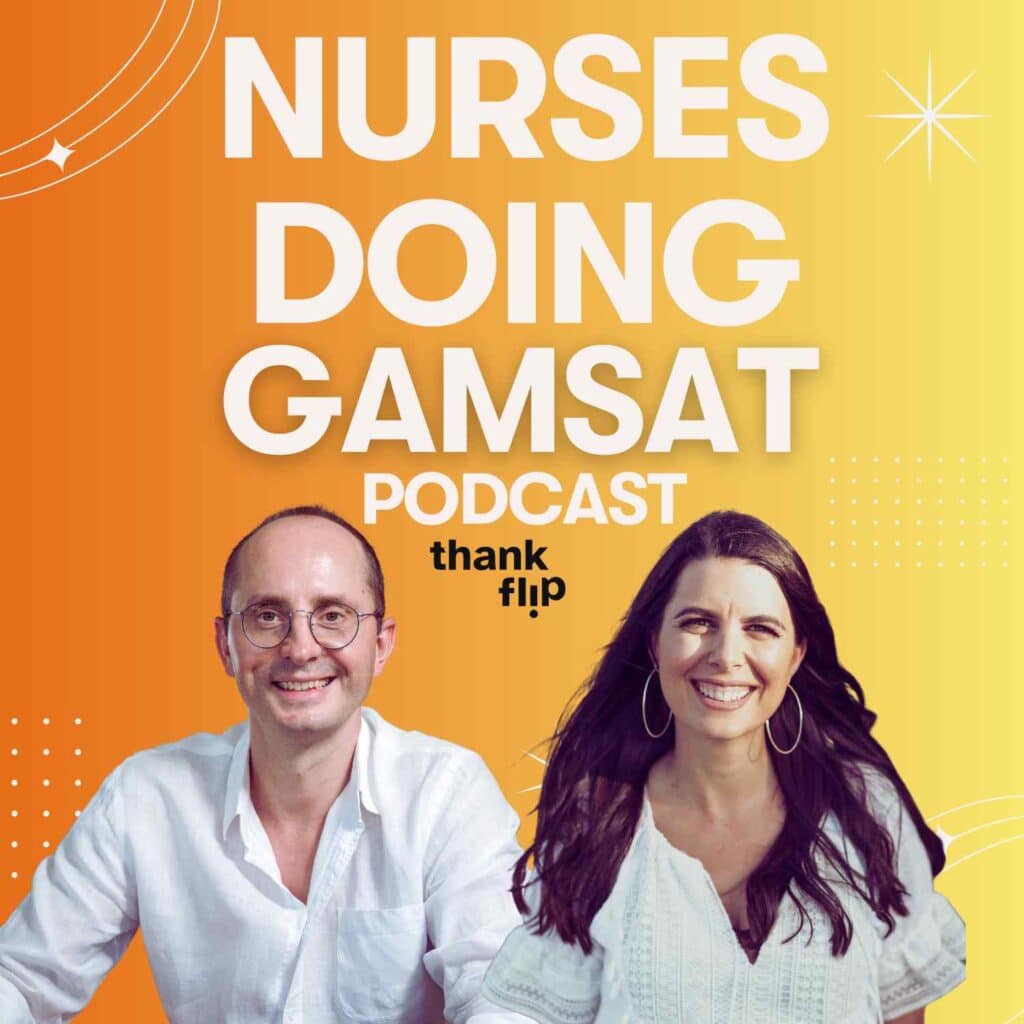In This Episode:
Struggling to make sense of GPAs and how they affect your medical school dreams?
In this episode, Mare and Dr Tom break down the complexities of GPAs, from weighted vs unweighted calculations to what counts as competitive for Australian medical schools. You’ll also discover practical tips to maximise your GAMSAT score and strategies for balancing study with a busy healthcare career.
Whether you’re a nurse or healthcare professional ready to take the next step, this episode has the insights you need to succeed.
Resources Mentioned:
-
Video Our Med Schools Summary page where we compare the Medical Schools side-by-side
-
An GEMSAS GPA Calculator
-
Ask us your GPA questions in the Nurses Doing GAMSAT Facebook group
Mare Forfa (00:16):
Hello and welcome to the Nurses Doing GAMSAT podcast! Super excited to be here. Welcome, Tom. How are you going today?
Dr Tom (00:24):
Very good, yeah. It’s hot here on the Sunshine Coast. It’s hit another level, and the humidity is nuts. Today, I went out just to pick up Ruby from gymnastics, and just going from the house to the car and back, I was sweating. I can only imagine our friends in Melbourne are very, very jealous right now.
Mare Forfa (00:55):
I feel like unless you’re in Queensland and know this heat, it’s better in your mind than it actually is to experience. Because this is not normal.
Dr Tom (01:05):
Yeah, it’s weird. There are different things you need to consider. Obvious things like plants needing more water, but also the garbage. This is a bit gross, just a heads-up. If you leave old meat in the bin, within a couple of days, you’ll have maggots. When we moved up here, we had to start freezing our rubbish.
Mare Forfa (01:28):
When we lived in New South Wales, we never had to do that. Legitimately, I never considered we’d have to freeze dinner leftovers we didn’t finish.
Dr Tom (01:46):
Yeah, because if you don’t, it’s going to get overrun. And about air conditioning—some people think you can get by without it. No, you need air conditioning up here. Otherwise, it’s crazy. And lots of showers.
Mare Forfa (02:02):
You’ve got the beach and the maggots, so you take the good with the bad.
Dr Tom (02:13):
And the humidity, and then the big storms blow in. It’ll be hot as hell during the day, and then in the afternoon, a big dramatic storm rolls through. It’s gone in 20 minutes, and then the humidity kicks back in. It’s like another country compared to Sydney.
Mare Forfa (02:28):
I’m telling you, if you’re a Queenslander listening, you know exactly what we’re saying.
Dr Tom (02:33):
Yeah, you’re like, “Yeah, that’s life.” But if you’re from Sydney, Melbourne, South Australia, Tasmania—even WA might be similar—it’s different. Darwin, though, is on another level entirely.
Mare Forfa (02:50):
It’s another weather system.
Dr Tom (03:02):
Really important topic today. So, let’s dive in. We’re talking about your GPA. This is a big part of your application process. The thing about GPAs is that it’s complicated, with many nuances, and everyone’s situation is a bit different. That’s why we’ve dedicated this episode to GPAs.
We’ll start with the very basics: what is a GPA? Then we’ll build up and talk about more complex aspects. We’ll also share free resources to help you figure out your GPA, where it stands, and what you need to do with it. Keep in mind that medical schools have different ways of calculating GPAs, adding to the complexity. And universities often change their application criteria over time.
What we’re going to do is try to make this episode as specific as possible while also directing you to updated resources on our website. This podcast will cover the principles, but for the latest details, check out the link in the show notes: thankflipgamsat.com/episode6. That’s the number six, with no spaces.
Mare Forfa (05:07):
Can I make a note? This episode isn’t about applications. GPAs and applications are separate. We’re diving deep into GPAs here. If you want an episode on applications, send us an email or reach out on socials. But, yeah, this is GPA-specific.
Dr Tom (05:29):
Exactly. Applications are far more than just your GPA and GAMSAT score. There’s so much more to it, and that will be another episode. But let’s start with the basics. So, what is the GPA? It stands for Grade Point Average, which is the score you get from your university based on your performance in your degree.
Your GPA is calculated on a seven-point scale, out of seven. Then there’s the WAM (Weighted Average Mark), which is out of 100, though a few universities convert it to a four-point scale. That’s not what we’re talking about today. You’ll need to convert your WAM to a GPA if required. Mare, do you want to explain the two types of GPAs that medical schools consider?
Mare Forfa (06:27):
Sure. There’s the weighted GPA and the unweighted GPA. An unweighted GPA looks at the last three years of study, giving equal emphasis to each year. So, if you went poorly in the first year but aced the final year, both years count equally.
A weighted GPA, on the other hand, places more emphasis on later years, assuming you’ve improved as you’ve gone along. Think of it this way: multiply your first-year GPA by one, your second year by two, and your third year by three, add them together, and divide by six. It’s not the actual calculation, but it gives you an idea of how the weighting works. Your final year carries more importance.
Dr Tom (08:03):
Exactly. Different universities prefer weighted or unweighted GPAs. Again, check our website where we lay all this out side-by-side for you. You’ll find it in the show notes. A big question we get is, how do I calculate my GPA? Well, most universities provide this information after each semester or year, but not all do. If they don’t, you’ll need to calculate it yourself.
The GEMSAS website is the best place to start for most medical schools. They handle the application process for many universities, but not all. Non-GEMSAS universities like Sydney, Flinders, Monash, and Tasmania have their own processes. Remember, the GPA your university gives you can differ from the one medical schools calculate, which can significantly impact your eligibility. Always double-check.
Mare Forfa (11:20):
Absolutely. If your GPA seems low, don’t panic. Head to the GEMSAS website and do their calculation. Your GPA might go up. Before spending tens of thousands on further study, check first. Don’t be afraid to get that result. Once you know, you can make informed decisions.
Dr Tom (11:58):
Right. So, what’s the minimum GPA? Mare?
Mare Forfa (12:15):
If I had a dollar for every time someone asked that! Minimums vary, but it’s important to note that meeting the minimum doesn’t guarantee an interview. Most universities have cut-offs around 5 to 5.6, but that’s not competitive. I think of it like traffic lights: red (not great), orange (iffy), and green (confident). A GPA of 6.5 to 7 is green. If you’re not getting interviews with that, it’s likely other factors, like your GAMSAT score.
For GPAs between 6 and 6.5, it’s orange. You might get an interview, but it’s nerve-wracking. Below 6? That’s where you need work. Don’t lose hope, though. Focus on your GAMSAT first, as the score lasts four years. Prioritise smashing the GAMSAT before fixing your GPA.
Dr Tom (17:14):
Exactly. Once you have a great GAMSAT score, revisit your GPA if needed. What’s next if your GPA is low? Mare?
Mare Forfa (17:37):
It depends. If your whole degree pulled you down, you may need more than one year of extra study. If just your first year was poor, focus on replacing that. Choose courses you’ll excel in. Don’t pick something unnecessarily challenging, like physics, unless you’re good at it. The goal is to achieve high scores to raise your GPA.
Dr Tom (18:43):
Exactly. Some universities give extra points for certain qualifications, like a PhD. Others focus only on your undergraduate degree. It’s nuanced, and we’ve summarised this on our website. Check the med school comparison page—it’s a lifesaver.
Mare Forfa (23:05):
It’s free, so why not use it? It saves so much time. Remember, coursework masters differ from research masters. Most universities prefer coursework.
Dr Tom (24:46):
If you’re juggling full-time work, GAMSAT, and extra study, we don’t recommend it. Focus on one thing at a time.
Mare Forfa (28:51):
Exactly. Get your GAMSAT done. It’s possible to do well in it while working full-time. Once that’s sorted, look at your GPA. Make wise decisions and manage your energy effectively.
Dr Tom (29:24):
So, now you know the difference between weighted and unweighted GPAs, competitive ranges, and how to improve them. If you’ve got questions, join our Nurses Doing GAMSAT Facebook group or check the show notes for resources. Anything else, Mare?
Mare Forfa (30:16):
Just that you can do it. Wherever you are, whatever your GPA or GAMSAT score, it’s not beyond you. You can absolutely change your life. You just have to decide and work your arse off.
Dr Tom (30:35):
Love it. Thanks, everyone. Thank you, Mare. We’ll chat next time.
Mare Forfa (30:42):
Bye for now.
Watch Now on YouTube:
Ready to Make This GAMSAT Your Last? Book a FREE 1-on-1 Call Now!
Before You Go — Get Your Freebie!
Click here download The GAMSAT Manifesto — our free GAMSAT study guide that has (so far) helped more than 60,000 people crush this highly unusual exam. Oh yeah, and did we mention…it’s free?





